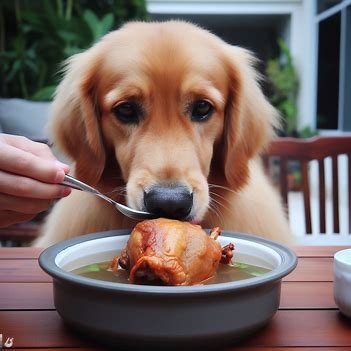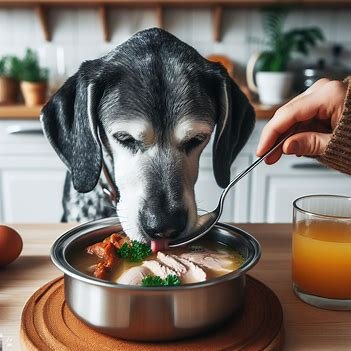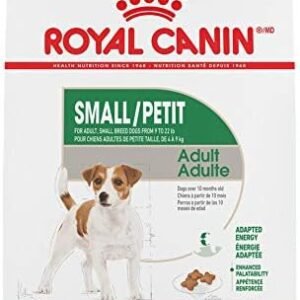Introduction
Did you know that chicken broth is one of the most beloved comfort foods in the world? Many of us have enjoyed a warm bowl of chicken soup on a cold day or when feeling under the weather. But as a dog owner, you might be wondering if it’s safe to share this delicious treat with your furry friend. Can dogs eat chicken broth? In this article, we will explore this question and provide you with a comprehensive guide on the topic. We’ll delve into the pros and cons of feeding chicken broth to your dog, discuss the nutritional aspects, and offer insights into how to ensure your pet’s safety when it comes to this popular culinary delight. So, let’s uncover the facts about dogs and chicken broth.

Table of Contents
Can Dogs Eat Chicken Broth?
Chicken broth is a staple in many households, used as a base for soups, stews, and various recipes. Its rich flavor and aroma can be enticing, not only to humans but also to our canine companions. You might wonder, can dogs eat chicken broth? In this section, we’ll explore the safety, nutritional aspects, and potential drawbacks of feeding chicken broth to your dog.
Safety of Chicken Broth:
Chicken broth itself is not inherently toxic or dangerous to dogs. In fact, many dogs enjoy the specific taste of this savory liquid. However, there are important considerations to keep in mind.
While plain, homemade chicken broth can be safe for dogs, you should be cautious about certain commercial broths available in stores. Store-bought broths may contain additives, such as salt or onion and garlic powder, which can be harmful to dogs. Always read the labels and opt for low-sodium or no-sodium-added varieties without any harmful ingredients.
Nutritional Benefits:
Chicken broth offers several nutritional benefits for dogs. It contains essential nutrients that can complement your dog’s regular diet. Here’s a breakdown of the key nutrients found in chicken broth:
- Protein: Chicken broth contains protein, which is a fundamental component of a dog’s diet. It helps maintain healthy muscles, skin, and fur.
- Minerals: Chicken broth contains essential minerals like calcium and phosphorus, which contribute to bone health.
- Electrolytes: The broth provides important electrolytes like potassium and sodium, helping to maintain a healthy balance in your dog’s body.
However, it’s important to remember that chicken broth alone should not replace your dog’s primary diet. While it can be a nutritious addition, it should be given in moderation and as part of a balanced canine diet.
Drawbacks:
Despite its potential benefits, there are some drawbacks to be aware of when feeding chicken broth to your dog:
Sodium Content: Commercial chicken broths often contain high levels of sodium, which can be harmful to dogs when consumed in excess. Excessive sodium intake can lead to dehydration and other health issues.
Ingredients: As mentioned earlier, you should be cautious about the ingredients in store-bought broths. Some additives or flavor enhancers like onion and garlic powder can be toxic to dogs.
Homemade vs. Store-Bought: Homemade chicken broth is generally a safer choice for dogs because you have control over the ingredients. If you choose to use store-bought broth, carefully read the label to ensure it’s dog-friendly.
In summary, plain homemade chicken broth can be safe and nutritious for dogs when used in moderation. It can serve as a tasty addition to your dog’s meals, making their food more appealing. However, it’s crucial to avoid broths with harmful additives, especially those high in sodium or containing toxic ingredients. Chicken broth should be seen as a complement to your dog’s primary diet, not a replacement. In the following sections, we’ll delve deeper into the considerations, risks, and ways to safely offer chicken broth to your furry friend.
How Much Chicken Broth Can a Dog Eat?
Understanding the appropriate amount of chicken broth to feed your dog is crucial to ensure their safety and well-being. Just like with any treat, moderation is key when introducing chicken broth into your dog’s diet. Here, we’ll explore the factors to consider when determining the right serving size for your furry friend.

1. Moderation is Essential:
The cardinal rule when feeding chicken broth to your dog is moderation. Treats, including chicken broth, should make up only a small portion of your dog’s daily calorie intake. While chicken broth can be a delightful addition to your dog’s meals, excessive consumption can lead to potential health issues.
2. Start Small and Observe:
Before offering a substantial amount of chicken broth, start with a small serving and observe how your dog reacts. Some dogs may have sensitivities or allergies to certain ingredients, even in plain chicken broth. Watch for any adverse reactions, such as upset stomach, diarrhea, or vomiting. If your dog tolerates it well, you can gradually increase the serving size, always in moderation.
3. Proper Preparation:
It’s essential to prepare the chicken broth properly before offering it to your dog. When making homemade chicken broth, ensure that it contains no harmful additives or seasonings like onions or garlic, which can be toxic to dogs. If you’re using store-bought broth, carefully check the label for any potentially harmful ingredients.
4. Consider Your Dog’s Size and Breed:
The size and breed of your dog play a role in how much chicken broth they can tolerate. Larger dogs typically have a higher tolerance for treats, including chicken broth, than smaller breeds. However, regardless of size, the key remains moderation. Always adjust the serving size based on your dog’s size and individual needs.
5. Serving Sizes Based on Weight:
When determining appropriate serving sizes, it’s helpful to consider your dog’s weight. Here’s a general guideline for offering chicken broth based on your dog’s weight:
- Small Breeds (up to 20 pounds): Start with 1-2 tablespoons and monitor for any adverse reactions.
- Medium Breeds (20-50 pounds): You can offer 2-4 tablespoons initially, with the possibility of increasing based on your dog’s tolerance.
- Large Breeds (50 pounds and above): Begin with 1/4 to 1/2 cup and adjust as needed.
Keep in mind that these are general guidelines, and your dog’s individual tolerance may vary. The best approach is to start with a small serving and observe how your dog responds. If they enjoy chicken broth and have no adverse reactions, you can cautiously increase the serving size, keeping it within the limits of their daily calorie intake.
In the next section, we’ll delve deeper into the potential risks associated with feeding chicken broth to dogs. Understanding these risks will help you make informed decisions regarding this tasty treat for your furry companion.
Risks of Feeding Chicken Broth to Dogs
While chicken broth can be a flavorful treat for your canine companion, it’s essential to be aware of potential risks associated with its consumption. In this section, we’ll explore these risks in detail, helping you make informed decisions about feeding chicken broth to your dog.
1. Possibility of Food Allergies:
Food allergies can affect dogs, and chicken broth is no exception. Some dogs may be sensitive to certain components of chicken broth, resulting in allergic reactions. Signs of food allergies in dogs may include itching, skin rashes, ear infections, or digestive problems. If you suspect your dog has food allergies, consult with your veterinarian to identify the specific allergen.
2. Short-Term Signs of Food Intolerance:
In addition to allergies, dogs may experience food intolerance to chicken broth. Food intolerance can manifest as gastrointestinal distress, causing symptoms such as diarrhea, vomiting, or an upset stomach. If your dog displays any of these short-term signs after consuming chicken broth, it’s advisable to discontinue offering it as a treat and consult with your veterinarian.
3. Potential Hazards in Chicken Broth:
While plain chicken broth is generally considered safe for dogs, certain components can pose potential hazards. Many commercial chicken broths contain additives, flavorings, or seasonings that may be harmful to dogs. Ingredients like onions, garlic, or excessive sodium can be toxic to dogs. Carefully check the label of store-bought chicken broth to ensure it’s free from any harmful additives.
4. Allergic Reactions:
Allergic reactions can be severe and life-threatening in some cases. Signs of an allergic reaction to chicken broth or any other food item may include difficulty breathing, swelling of the face or throat, hives, or extreme lethargy. If you notice any of these severe symptoms, seek immediate veterinary attention.
5. Specific Issues in Dogs:
Specific issues related to chicken broth consumption may arise in some dogs. While most dogs can enjoy this treat without problems, certain individuals may be more prone to food allergies or intolerance. Older dogs or those with pre-existing medical conditions may be at higher risk for adverse reactions.
6. Signs and Symptoms of Adverse Reactions:
Adverse reactions to chicken broth or any food item can vary from mild to severe. Here are common signs and symptoms to watch out for in your dog:
Mild Reactions: These may include mild digestive upset, like diarrhea or vomiting, itching, or mild discomfort.
Moderate Reactions: Symptoms can include more severe digestive distress, skin issues, or moderate discomfort.
Severe Reactions: Life-threatening symptoms may involve extreme difficulty breathing, swelling, or severe gastrointestinal distress.
In the event of an adverse reaction, it’s crucial to stop feeding chicken broth immediately and contact your veterinarian for guidance. For severe reactions, seek immediate veterinary care.
Understanding the potential risks and being vigilant for signs of adverse reactions will help you make informed decisions when it comes to feeding chicken broth to your furry friend. In the next section, we’ll explore ways to make feeding chicken broth to your dog more enjoyable and creative. We’ll also share some delightful recipes and ideas for homemade treats.
How to Feed Chicken Broth to Your Dog and Make It Enjoyable
Feeding chicken broth to your dog can be a delightful experience for both you and your furry friend. In this section, we’ll explore various ways to offer chicken broth to your dog and make it a delightful addition to their diet. We’ll also discuss how you can incorporate chicken broth into homemade treats and meals, enhancing your dog’s dining experience.
1. Straight from the Bowl:
The simplest way to feed your dog chicken broth is by pouring it into their food bowl. For dogs who enjoy the taste, plain chicken broth can be an enticing addition to their kibble or regular meals. Ensure that the broth is at a lukewarm temperature and not too hot to prevent any burns.
2. Frozen Broth Treats:
To keep your dog cool and entertained, consider freezing chicken broth in ice cube trays or silicone molds. Your pup will love licking and chewing on these icy treats during hot weather. It’s a fun way to provide hydration and nutrition while helping your dog beat the heat.
3. Homemade Chicken Broth Treats:
Get creative in the kitchen and whip up some homemade chicken broth treats for your dog. Here’s a simple recipe:
Ingredients:
- 2 cups of plain chicken broth (make sure it’s dog-friendly, without harmful additives)
- 1 cup whole wheat flour
- 1/2 cup rolled oats
Instructions:
- Preheat your oven to 350°F (175°C) and line a baking sheet with parchment paper.
- In a mixing bowl, combine the chicken broth, whole wheat flour, and rolled oats.
- Stir until the mixture forms a dough-like consistency.
- Roll out the dough and use dog-themed cookie cutters to create fun shapes.
- Place the treats on the baking sheet and bake for 20-25 minutes until they turn golden brown.
- Allow the treats to cool before serving them to your dog.
4. Enhancing Regular Meals:
If your dog is a picky eater, you can enhance their regular meals with chicken broth. Pour a small amount of broth over their kibble or homemade food to make it more appealing. The aroma and taste of the broth can encourage dogs to eat.
5. A Warm Treat on Chilly Days:
During cold weather, consider serving warm chicken broth to your dog as a comforting and nourishing treat. Warm chicken broth can be a soothing and heartwarming experience, especially when your dog is feeling under the weather.
6. Soggy Doggy Biscuits:
Dipping dog biscuits or kibble in chicken broth can create “soggy doggy” treats that your pup will find irresistible. Let the biscuits soak for a moment before serving them, allowing the flavors to meld.
7. Homemade Broth-Based Meals:
You can also use chicken broth as a base for homemade meals. Mix it with other dog-friendly ingredients like lean cooked chicken, vegetables, and rice to create a hearty, homemade stew. Just make sure to use a low-sodium broth and avoid any seasonings or ingredients that are harmful to dogs.
8. Slow Cooker Delights:
A slow cooker can be your best friend in preparing delicious and nutritious meals for your dog. Create a dog-friendly stew by slow-cooking chicken, broth, vegetables, and whole grains until everything is tender and flavorful.
9. Hydration Solution:
If your dog doesn’t drink enough water, you can mix a small amount of chicken broth with water to encourage them to stay hydrated. It’s particularly useful if your dog is recovering from illness and needs extra fluids.
10. Frozen Popsicles:
On hot summer days, consider making chicken broth popsicles by freezing a mixture of broth and water. Your dog will appreciate these refreshing and hydrating treats.
11. Consult with Your Vet:
Before making any significant changes to your dog’s diet, consult with your veterinarian. They can provide guidance on the appropriate amount of chicken broth to feed your dog based on their age, size, and specific nutritional needs.
In the final section of this article, we’ll answer some common questions about dogs and chicken broth. Stay tuned to gain more insights into safely incorporating this tasty treat into your dog’s diet.
10 FAQs About Dogs Eating Chicken Broth
In this section, we will address some frequently asked questions about dogs consuming chicken broth. These questions cover various aspects, from the safety of chicken broth to its potential benefits and limitations when added to your dog’s diet.
1. Can dogs have plain chicken broth from the store?
Yes, dogs can have plain chicken broth from the store as long as it is low in sodium and free from harmful additives like onions, garlic, or excessive seasonings. Always check the label for any ingredients that may be harmful to dogs.
2. Is homemade chicken broth better for dogs?
Homemade chicken broth can be a great option for dogs because you have more control over the ingredients. It allows you to avoid unwanted additives, excessive salt, or ingredients that may not be suitable for dogs. Just make sure to use plain, unseasoned chicken broth.
3. Can chicken broth help my dog stay hydrated?
Chicken broth can indeed help your dog stay hydrated, especially when mixed with water. It can entice dogs to drink more, which is useful in cases where your pup needs extra fluids. However, chicken broth should not replace fresh water in your dog’s diet.
4. What are the benefits of feeding chicken broth to dogs?
Feeding chicken broth to dogs can offer several benefits. It can improve the taste of their food, making it more appealing. It may also provide some essential nutrients like protein and vitamins. Additionally, chicken broth can be a comforting treat, especially when served warm.
5. Can chicken broth be used as a nutritional supplement for dogs?
While chicken broth is not a complete nutritional supplement, it can complement your dog’s diet by providing some extra nutrients. It’s a good source of protein and can be beneficial when dogs have a reduced appetite.
6. Can chicken broth help sick dogs?
Yes, chicken broth can be beneficial for sick dogs, especially if they have a reduced appetite. The warmth and aroma of chicken broth can be comforting, and it provides nourishment when dogs are feeling unwell. However, it should not replace veterinary care if your dog is seriously ill.
7. Can I use chicken broth as a training treat for my dog?
Chicken broth can be used as a training treat in moderation. You can dip your dog’s regular treats or use small cubes of frozen chicken broth as rewards during training. It’s a tasty and low-calorie option for positive reinforcement.
8. How much chicken broth is safe for my dog?
The amount of chicken broth that is safe for your dog varies based on their size, age, and specific dietary needs. Generally, a small dog may have a few spoonfuls per day, while a larger dog can consume more. It’s important to consult your veterinarian for precise guidance.
9. Can chicken broth cause allergies or sensitivities in dogs?
While chicken broth is generally well-tolerated by dogs, some individuals may develop sensitivities or allergies to chicken or certain components in the broth. If you notice any signs of food allergies, such as skin irritations or digestive problems, consult your vet and consider discontinuing chicken broth.
10. Can chicken broth cause diarrhea in dogs?
Chicken broth, when consumed in moderation, is unlikely to cause diarrhea in dogs. However, excessive intake or consumption of chicken broth with high levels of sodium could lead to digestive issues. It’s essential to monitor your dog’s response and adjust their intake accordingly.
In conclusion, chicken broth can be a safe and enjoyable treat for many dogs when used in moderation and with careful consideration of their specific dietary needs. When in doubt, always consult with your veterinarian for guidance tailored to your dog’s unique requirements.
Now that we’ve answered these common questions about dogs and chicken broth, let’s summarize the main points and offer some alternatives in the conclusion of this article.
Conclusion
In conclusion, it’s clear that dogs can enjoy chicken broth in small amounts as an occasional treat. While chicken broth offers some nutritional benefits, including protein and vitamins, it should be administered in moderation. It can make your dog’s meals more enticing and serve as a comforting option, particularly when they are unwell. However, there are risks associated with excessive consumption or the use of broth with high sodium content. Therefore, it’s crucial to be aware of the potential pitfalls and ensure that chicken broth complements your dog’s primary diet rather than replacing it.
As responsible dog owners, you should always prioritize your dog’s well-being. If you’re considering adding chicken broth to your dog’s diet or have any concerns, consult your veterinarian for personalized guidance. They can offer recommendations tailored to your dog’s specific needs and dietary requirements.
If you’re looking for alternative treats or snacks for your furry friend, there are several safe and healthy options. You can consider using fruits like apple slices, blueberries, or small pieces of carrot, all of which provide essential nutrients and are low in sugar and acidity. Just remember to remove any seeds, pits, or cores before offering them to your dog.
Do you have any questions or comments about feeding chicken broth to your dog? We’d love to hear from you. Share your experiences and thoughts with us in the comments section below or on our social media pages. Your insights and feedback can contribute to the well-being of dogs everywhere.



















